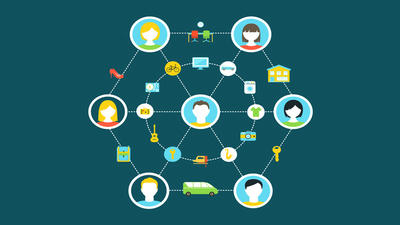
In recent years, the concept of the sharing economy has gained significant momentum, transforming how we think about ownership, consumption, and economic transactions. This new economic model promotes the sharing of resources and services among individuals and organizations, often facilitated by digital technology. By emphasizing access over ownership, the sharing economy is reshaping markets across various sectors, including transportation, hospitality, finance, and more.
Understanding the Sharing Economy
Definition of the Sharing Economy
The sharing economy, also known as collaborative consumption, refers to a system where individuals share access to goods and services, often through online platforms. This model allows multiple users to share resources that might otherwise be underutilized, effectively maximizing the use of existing assets.
Historical Context
The roots of the sharing economy can be traced back to informal sharing practices that have existed for centuries. However, the modern sharing economy took shape in the early 21st century, fueled by technological advancements and shifts in consumer behavior. Key milestones include:
-
Technological Innovation: The rise of the internet and mobile technology enabled individuals to connect instantly, leading to the birth of platforms that facilitate sharing, such as Airbnb, Uber, and TaskRabbit.
-
Economic Recessions: Economic pressures, such as the 2008 financial crisis, prompted individuals to seek alternative income sources and minimize expenses, paving the way for sharing economy services.
-
Sustainability Consciousness: Growing awareness of environmental issues has driven people to adopt more sustainable consumption practices, such as sharing or renting instead of owning.
Key Characteristics of the Sharing Economy
-
Access Over Ownership: The sharing economy emphasizes access to goods and services rather than individual ownership. This shift can reduce the demand for new products, ultimately leading to less waste.
-
Peer-to-Peer Transactions: Most transactions in the sharing economy occur directly between consumers, bypassing traditional intermediaries. Online platforms facilitate these connections, allowing users to transact safely and efficiently.
-
Flexible Use of Resources: The sharing economy maximizes the utilization of underused assets. For instance, an individual may rent out a spare room or shared vehicle, effectively using resources that would otherwise sit idle.
-
Digital Platforms: Technology plays a central role in the sharing economy. Online platforms provide the infrastructure for users to connect, communicate, and conduct transactions securely.
How the Sharing Economy is Reshaping Markets
1. Transportation
The transportation sector has been profoundly disrupted by the sharing economy, with ride-sharing services emerging as a prominent example. Companies like Uber and Lyft have transformed traditional taxi services by allowing individuals to use their personal vehicles to provide rides. This shift has resulted in several changes:
-
Increased Competition: The introduction of ride-sharing apps has intensified competition in the transportation market, driving down prices and improving service quality for consumers.
-
Flexible Work Opportunities: Gig drivers can choose their hours and work as much or as little as they want, leading to a more flexible workforce in the transportation sector.
-
Reduced Car Ownership: As more people opt for ride-sharing services, the need for personal vehicle ownership diminishes. This trend can contribute to reduced traffic congestion and lower emissions in urban areas.
2. Hospitality
The hospitality industry has also experienced significant transformation due to the sharing economy. Platforms like Airbnb allow homeowners to rent out their spare rooms or entire homes to travelers. This model has disrupted traditional hotels in several ways:
-
Diverse Accommodation Options: Travelers now have access to a wide range of lodging choices, from luxury apartments to budget-friendly shared spaces, enabling them to find accommodations that suit their preferences and budgets.
-
Local Experiences: Airbnb and similar platforms emphasize unique, localized experiences, encouraging travelers to engage authentically with their destinations rather than relying solely on tourist-centric hotels.
-
Economic Benefits for Hosts: Homeowners can earn supplementary income by renting out their properties, generating economic benefits for individuals and local communities.
3. Finance
The sharing economy has also permeated the financial sector, with peer-to-peer lending and crowdfunding platforms gaining popularity. These models allow individuals to lend money directly to others, often with better rates than traditional financial institutions can provide. Key developments include:
-
Access to Capital: Peer-to-peer lending platforms have democratized access to credit, particularly for individuals and small businesses that may struggle to secure loans through traditional banks.
-
Investment Opportunities: Crowdfunding platforms like Kickstarter and Indiegogo have made it easier for entrepreneurs to raise funds for projects while allowing individuals to invest in ideas they believe in.
-
Disruption of Traditional Banking: The growth of peer-to-peer lending and crowdfunding can disrupt traditional banking models, compelling financial institutions to innovate and adapt to changing consumer expectations.
4. Goods and Services
The sharing economy is not limited to services but also extends to physical goods. Platforms that facilitate the sharing, renting, or swapping of items are on the rise. Examples include:
-
Tool Libraries: Community-driven initiatives allow individuals to borrow tools and equipment instead of purchasing them, promoting resource-sharing and community engagement.
-
Clothing Rental: Platforms like Rent the Runway enable consumers to rent high-quality clothing for specific occasions, reducing the impulse to buy new items for infrequent use and fostering sustainable fashion practices.
-
Car Sharing: Services like Zipcar allow individuals to rent cars by the hour, offering an alternative to traditional car ownership and reducing the environmental impact of vehicles.

Benefits of the Sharing Economy
1. Economic Efficiency
The sharing economy promotes economic efficiency by maximizing the utilization of existing resources. Through peer-to-peer sharing and rental models, underused assets are put to work, reducing waste and the need for new production.
2. Cost Savings for Consumers
By accessing shared goods and services, consumers can save money compared to traditional ownership or purchasing models. The sharing economy often provides affordable alternatives, making it easier for individuals to access resources without incurring significant expenses.
3. Increased Income Opportunities
The sharing economy creates new income opportunities for individuals. Those with spare assets, such as a vehicle or extra living space, can monetize these resources, contributing to financial stability and economic resilience.
4. Community Building
Sharing economy platforms often foster community connections by encouraging interactions among users. These platforms can strengthen local networks and promote social cohesion, as individuals engage with their neighbors and share resources.
5. Environmental Benefits
The sharing economy has the potential to reduce overall consumption and waste. By sharing, renting, or reusing goods, individuals can minimize their ecological footprint, contributing to a more sustainable future.
Challenges Facing the Sharing Economy
1. Regulatory Hurdles
As the sharing economy has rapidly evolved, regulatory frameworks have struggled to keep pace. Governments face challenges in creating appropriate regulations that balance innovation with consumer protection. Issues such as safety, liability, and taxation must be addressed to ensure a fair marketplace.
2. Quality Control and Trust Issues
Peer-to-peer transactions inherently involve a level of trust between users. Maintaining quality control across diverse platforms can be challenging. Without effective mechanisms for vetting hosts and service providers, consumers may be hesitant to engage in sharing economy transactions.
3. Income Inequality
While the sharing economy can create income opportunities, it may also exacerbate income inequality. Those with access to high-value assets, such as property in desirable locations, may benefit disproportionately compared to individuals with fewer resources.
4. Impact on Traditional Industries
The rise of the sharing economy poses significant challenges to established industries. Traditional businesses may struggle to compete with the lower prices and more flexible options offered by sharing economy platforms. This disruption can lead to job losses and industry instability in sectors that are unable to adapt.
5. Data Privacy and Security
With the sharing economy relying heavily on online platforms, concerns about data privacy and security are paramount. Users must trust that their personal information will be protected, and breaches can have severe implications for user trust and platform viability.
The Future of the Sharing Economy
1. Integration with Technology
The future of the sharing economy will be increasingly intertwined with technological advancements. Innovations like blockchain technology may enhance trust and transparency in peer-to-peer transactions, while artificial intelligence could improve the matching of supply and demand within sharing platforms.
2. Public Policy Support
As the sharing economy continues to grow, governments will need to develop clear regulatory frameworks that support innovation while ensuring consumer protection. Policymakers must balance the interests of traditional industries with those of emerging platforms to create a fair and competitive marketplace.
3. Emphasis on Sustainability
With environmental concerns gaining traction, the sharing economy is likely to evolve toward more sustainable practices. Consumers may demand greater transparency regarding the environmental impact of sharing services, prompting platforms to adopt greener business models.
4. Expansion of Service Offerings
The sharing economy will likely expand into new sectors, offering services that have yet to be fully realized. Industries such as healthcare, education, and food delivery may see increased participation in sharing economy models, further diversifying the marketplace.
5. Community-Centric Models
Future sharing economy initiatives may place greater emphasis on community engagement and support. Platforms that prioritize local connections and foster meaningful relationships among users will likely thrive in a market increasingly driven by social considerations.
Conclusion
The sharing economy represents a transformative shift in how we approach consumption, ownership, and economic transactions. By facilitating the sharing of resources and services, this model promotes economic efficiency, social connections, and environmental sustainability. However, challenges such as regulatory hurdles, quality control, and income inequality must be addressed to ensure that the sharing economy benefits all participants.
As we move into the future, the continued evolution of the sharing economy will depend on technological advancements, supportive public policies, and a focus on sustainability and community engagement. Embracing the principles of the sharing economy can lead to a more equitable and sustainable economic landscape that aligns with the needs and values of modern society.



